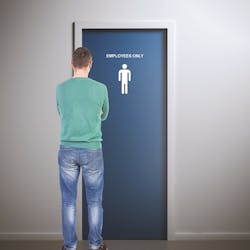Anyone who has ever driven a truck for any length of time has experienced the urgent search for restroom facilities with parking for an 18 wheeler. Unfortunately, drivers don’t always have access to toilet facilities on the road or while loading or unloading.
There’s also the situation where a trucker is at a shipper or receiver waiting to load or unload and the shipper has a “No Outside Persons” policy concerning their employee restrooms, or they provide truckers with a portable toilet similar to what is used at most construction sites.
The question for shippers and receivers is, what is the responsibility of the customer when it comes to providing restroom facilities?
Many truckers feel like second-class citizens when they’re denied access to a bathroom or when they’re pointed in the direction of a portable toilet in the parking lot.
So, what’s the other side of the discussion? Are shippers and receivers responsible for providing indoor restroom facilities for truckers who pick up or deliver at their warehouse or plant?
The drivers have some viable arguments. Detention time at the dock is an issue facing the vast majority of truckers. Unless the plant or warehouse provides restrooms for truckers, the trucker is out of luck. Sadly, the alternatives are not the sort of thing that anyone should have to put up with while trying to do a professional job.
Shippers and receivers, however, also have some valid points. For one, it can cost at least $20,000 to build a restroom approved by the health department. In most cases, this requires building permits and municipal water and sewage department assessments. If the facility has on-site sewage, i.e., a septic system, then adding a public restroom is seldom an option because of strict groundwater protections.
Point two, there are times when non-company personnel must pass through sensitive and proprietary areas because of a building’s configuration to reach a restroom. And what about a trucker’s safety? Sometimes the trucker has to walk through a manufacturing area or one with forklifts and other machinery. The operators of the equipment have to be on the lookout for non-employees under foot.
Finally, while the vast majority of truckers are caring and careful, it only takes one disgruntled trucker to trash a restroom, leading the company to close the restroom to all.
What’s the solution?
After driving 2.5 million mi. on 18 wheels, I know the challenges truckers face—I’ve been there, done that. In my experience, the only way to guarantee a safe, sanitary restroom is by providing your own facility within the cab of your truck. (I did it for my entire driving career, even in a COE. It’s far easier today with a conventional.) Good camper-style portable toilets cost in the neighborhood of $100.
The advantages of having a chemical toilet in the truck are numerous, including the following:
- When a trucker is on the road and miles away from accessible restrooms, it’s readily available.
- If a trucker pulls into a rest area or truck stop that is potentially unsafe, he/she now has the convenience of never having to leave the cab, improving safety.
- Public restrooms harbor an unhealthy mix of bacteria and germs that can make you sick and lead to everything from the common cold to the flu—and worse. Having a portable toilet on board the truck can ease the fear of having to use a public restroom.
- Having a portable toilet eliminates the need to ask customers to use their restrooms and maintains the security of their facilities.
- Disposal is simple. Many truck stops offer dump sites to empty your waste tanks. For example, Flying J has always had them, and disposal/cleaning was just a part of my truck fueling process.
Another good tip is to always have supplies on board the truck with which to clean a shipper’s restroom if necessary. Back in the day, I moved household goods, and when my employees had to use the bathroom, I made sure that it was left cleaner than it was when we arrived. The same was true in many warehouses where I delivered or picked up; I never considered it the job of the customer to clean up after me.
Truckers are in the business of providing customer service, not accusing shippers and receivers of treating them like second-class citizens. If a trucker feels like he/she is being treated as such, maybe he/she needs to consider how customer service is handled. You have to earn the respect of the shipper or receiver—not the other way around.
The real solution is that it’s time for truck makers to start designing toilet facilities with running water in the OTR trucks they manufacture. Step up to the plate!
